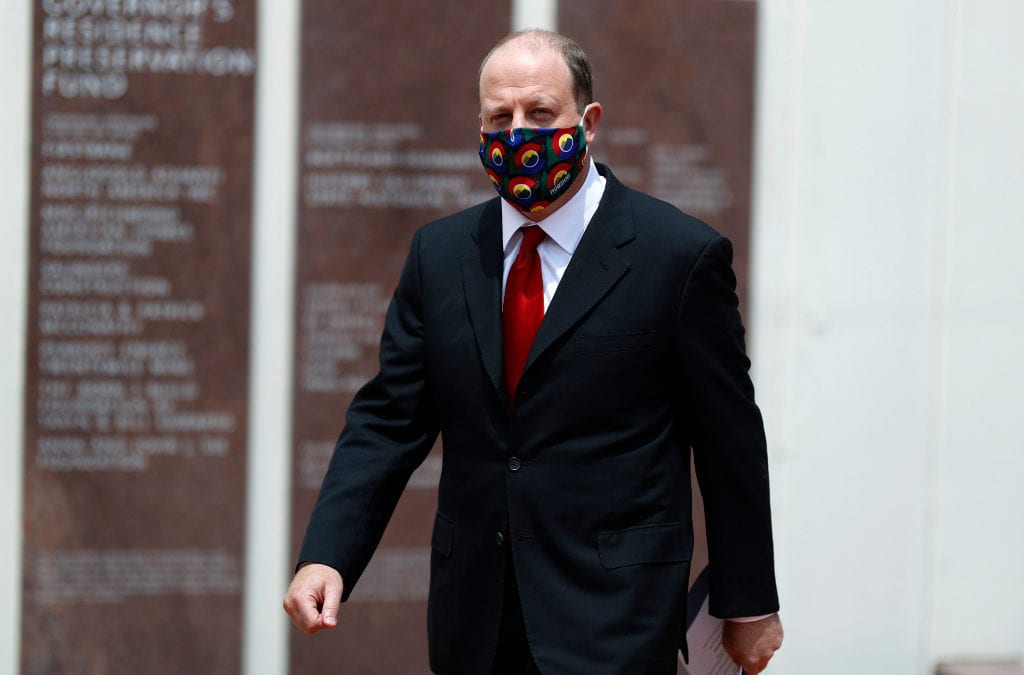Gov. Jared Polis gave Colorado businesses the authority Thursday to refuse service to customers not wearing masks as state health officials issued new guidance allowing houses of worship, gyms, parks and swimming pools to reopen to limited capacities.
The state’s guidance documents for personal and outdoor recreation, as well as churches, synagogues and mosques, are similar to drafts issued earlier this week, but with some changes — marking the latest step toward restoring civic and recreational functions that were curtailed this spring in the push to slow the spread of COVID-19.
Houses of worship in Colorado can now reopen at 50% capacity or with up to 50 people in the worship space, whichever is fewer. For both indoor and outdoor worship, participants should be spaced 6 feet apart. And it’s recommended that all congregants wear masks.
The new guidance for reopening gyms, fitness classes, rec centers and other indoor sports facilities allows them to operate at up to 25% capacity or 50 people per room — whichever number is fewer — as long as members can stay 6 feet apart. That’s a different from the draft guidelines, which said “recreators” would be permitted in groups of 10 people per room.
“This is more than I thought they would do, so it makes me happy,” said Crossfit Broadway owner Jason Kelly, who was already conducting classes of three or four people under the state’s previous “safer at home” guidelines.
Under the new guidance, outdoor swimming pools can reopen to 50% capacity or up to 50 people, whichever is fewer. And playgrounds at parks can now open to up to 10 people at a time, with proper 6-foot social distancing.
At a wide-ranging news conference, the governor also outlined the possibility of allowing some visitors to nursing homes, announced $44 million in federal funds will go toward high-need schools and expressed support for demonstrations against racism and police brutality — while also worrying aloud that the protests will lead to a surge in COVID-19 cases.
And as more and more of Colorado comes back online, Polis described facial coverings as the key to completely reopening the state’s economy. Under an executive order, businesses will be able to ask people who don’t wear masks to leave, in the same way they require shirts and shoes, he said.
Polis unveiled a video advertisement, which promised, “Our masks are our passport to the Colorado we love.” He also specifically called out men, who may be more reluctant to wear masks because they fear appearing weak or “uncool.”
“A mask-wearing culture is our ticket to reopening sooner,” the governor said. “The more people wear masks in public, the less social distancing is required.”
While masks are an important strategy to slow the spread of the coronavirus, they’re not a replacement for other social distancing measures, said Elizabeth Carlton, an assistant professor of environmental and occupational health at the Colorado School of Public Health. It’s also important to identify and isolate people with symptoms, and to avoid being close to other people for long periods of time, especially when gathering indoors, she said.
Earlier this week, the School of Public Health announced projections that Colorado could face a bigger spike in COVID-19 cases over the summer than it had in April if people relax their social distancing too much. In some modeled scenarios, hospital intensive-care units could be overwhelmed.
“If we go back to where we were with our contacts before the pandemic, we could be in bad shape for the summer,” Carlton said.
Polis also pledged the state would release guidance for nursing homes in the near future, to allow people to visit their relatives if they’ve tested negative for the new virus in the previous 48 hours.
He called the proposal a “Lifeline Pass,” which would require relatives to show no symptoms and have no known exposure to the virus. Testing for the virus can result in false negatives, and some people show no symptoms, so it’s not clear the pass process would ensure no one carrying COVID-19 is allowed to visit.
The pass is needed to balance older people’s need for social support with the deadly toll the virus takes on a vulnerable population, Polis said. More than half of Colorado’s coronavirus deaths have been among people living in facilities for senior citizens or those with disabilities.
“We cannot sacrifice our elders in an effort to save them,” he said.
Denver Post staff writer John Meyer contributed to this report.
This content was originally published here.

